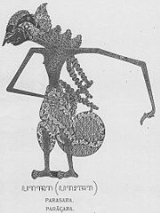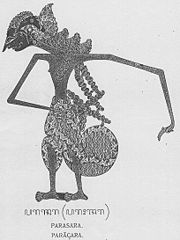
Parashara
Encyclopedia

Maharishi
Maharishi is the anglicized version of the Sanskrit word Maharshi महर्षि . Maharishi is often use as an addition to a person's name as an honorary title. The term was first seen in modern English literature in the 18th century...
and author of many ancient Indian texts. Parāśara (or Parashar) was the grandson of Vashista, the son of Śakti Maharṣi
Śakti Maharṣi
Śakti Maharṣi was son of Vaśiṣṭha and father of Parāśara. He was one among the Advaita Guru Parampara. According to the Vedas, Brahma created Vaśiṣṭha; who with Arundhati begot Śakti Maharṣi.-Death:...
, and the father of Vyasa
Vyasa
Vyasa is a central and revered figure in most Hindu traditions. He is also sometimes called Veda Vyasa , or Krishna Dvaipayana...
. There are several texts which give reference to Parāśara as an author/speaker. Modern scholars believe that there were many individuals who used this name throughout time whereas others assert that the same Parāśara taught these various texts and the time of writing them varied. The actual sage himself never wrote the texts, he was known as a traveling teacher, and the various texts attributed to him are given in reference to Parāśara being the speaker to his student.
Genealogy
According to the VedasVedas
The Vedas are a large body of texts originating in ancient India. Composed in Vedic Sanskrit, the texts constitute the oldest layer of Sanskrit literature and the oldest scriptures of Hinduism....
, Brahma
Brahma
Brahma is the Hindu god of creation and one of the Trimurti, the others being Vishnu and Shiva. According to the Brahma Purana, he is the father of Mānu, and from Mānu all human beings are descended. In the Ramayana and the...
created Vashista who with Arundhati had a son named Shakti-muni who sired Parāśara. With Satyavati
Satyavati
Satyavati was the queen of the Kuru king Shantanu of Hastinapur and the great-grandmother of the Pandava and Kaurava princes . She is also the mother of the seer Vyasa, author of the epic...
, Parāśara fathered Vyasa
Vyasa
Vyasa is a central and revered figure in most Hindu traditions. He is also sometimes called Veda Vyasa , or Krishna Dvaipayana...
. Vyasa sired Dhritarashtra
Dhritarashtra
In the Mahābhārata, Dhritarashtra was King of Hastinapur at the time of the Kurukshetra War, the epic's climactic event. He was born the son of Vichitravirya's first wife Ambika, and was fathered by Vyasa. He was blind from birth, and became father to a hundred children by his wife Gandhari...
, Pandu
Pandu
In the Mahābhārata epic, King Pandu is the son of Ambalika and Rishi Ved Vyasa. He is more popularly known as the father of the Pandavas and ruled Hastinapur.-Birth:...
and Vidura
Vidura
Vidura was an important figure in the Mahabharata, a major Hindu epic. He was half-brother to the kings Dhritarashtra and Pandu of Hastinapura, born the son of the sage Vyasa and a lady-in-waiting to the queens Ambika and Ambalika of the city...
through his dead brother's wives. Vyasa also sired Śuka
Suka
The Suka was a unique fiddle that was played vertically, on the knee or hanging from a strap, and the strings were stopped at the side with the fingernails; similar to the Gadulka. The body of the instrument was very similar to the modern violin, but the neck was very wide, and the pegbox was crude...
through his wife, Jābāli's daughter Pinjalā (Vatikā). Thus Parashara was the great-grandfather of both the warring parties of the Mahābhārata, the Kauravas and the Pāndava
Pandava
In the Hindu epic Mahābhārata, the Pandava are the five acknowledged sons of Pandu , by his two wives Kunti and Madri. Their names are Yudhisthira, Bhima, Arjuna, Nakula and Sahadeva. Although, Karna is told by Lord Krishna that according to the laws and ethics he is the first son of Kunti making...
s.
Life
Parāśara Muni was raised by his grandfather, Vashista, because he lost his father at an early age. His father, Shakti-muni, was on a journey and came across an angry RakshasaRakshasa
A Rakshasa or alternatively rakshas, is a race of mythological humanoid beings or unrighteous spirit in Hindu and Buddhist religion...
(demon) who had once been a king but was turned into a demon feeding on human flesh as a curse from Vishwamitra. The demon devoured Parāśara’s father. In the Visnu Purana
Vishnu Purana
The Vishnu Purana is a religious Hindu text and one of the eighteen Mahapuranas. It is considered one of the most important Puranas and has been given the name Puranaratna...
, Parāśara speaks about his anger from this:
"I had heard that my father had been devoured by a Rakshasa employed by Vishwamitra: violent anger seized me, and I commenced a sacrifice for the destruction of the Rakshasas: hundreds of them were reduced to ashes by the rite, when, as they were about to be entirely exterminated, my grandfather Vashista said to me: Enough, my child; let thy wrath be appeased: the Rakshasas are not culpable: thy father's death was the work of destiny. Anger is the passion of fools; it becometh not a wise man. By whom, it may be asked, is any one killed? Every man reaps the consequences of his own acts. Anger, my son, is the destruction of all that man obtains by arduous exertions, of fame, and of devout austerities; and prevents the attainment of heaven or of emancipation. The chief sages always shun wrath: be not subject to its influence, my child. Let no more of these unoffending spirits of darkness be consumed. Mercy is the might of the righteous.”
Sage Parashara, on one of his travels across the country, halted for the night in a little hamlet on the banks of the river Ganga. He was put up in the house of the village chief. When dawn broke, the chief asked his daughter, Satyavati, to ferry the sage to his next destination. When in the ferry, Parashara was offended by the stench of raw fish. According to legend, the Ganga has no fish within her waters. He asked Satyavati as to from where the foul stench was emanating. Satyavati was a fisherman's daughter, and pursued the same occupation. It was from her the stench emanated. Realising this, Parashara gave her the epithet "Matsyagandha", meaning "one with the smell of fish". Satyavati was thoroughly ashamed. Parashara felt sorry for his cruelty, and instantly granted her the boon, that the finest fragrance may emit from her person.
Parashara grew attached to Satyavati, and desired to perform coitus with her. But Satyavati was terrified of him and gave an excuse that there were many people present on either sides of Ganga. So Parasara Muni, with his mystic power, created a dense sheet of mist around the boat. He then took her to an island on Ganga and in due course, they had a son, by name Vyasa. But Parashara's wandering ascetic life did not suit Satyavati, and the couple separated. While parting, Parashara granted Satyavati another boon; that she may have her lost virginity back. Satyavati returned to her father after this, and in due course, married Shantanu.
Parāśara was known as the "limping sage". He had his leg wounded during the attack of his ashram. When a rishi dies he merges back into an element or an archetype, Sage Jaimini was trampled by wild elephants, Sage Gautama was eaten by Cannibals, etc. When Sage Parāśara was walking through a dense forest he and his students were attacked by wolves. He was unable to get away in his old age with a lame leg he left this world merging into the wolves .
The birth place of Parashar Muni is believed to be at Panhala
Panhala
Panhala is a city and a Hill station Municipal Council 18 km northwest of Kolhapur, in Kolhapur district in the Indian state of Maharashtra. Panhala is the smallest city in Maharastra and being a Municipal Council the city is developing rapidly. The city sprawls in the Panhala fort commands...
fort in Kolhapur district of Maharashtra. A cave supposed to be of Parashar Muni is present at the fort.
Rigveda
In the Rigveda, Parāśara, son of Sakti-Muni (Parāśara Śāktya), is the seer of verses 1.65-73 which are all in praise of AgniAgni
Agni is a Hindu deity, one of the most important of the Vedic gods. He is the god of fire and the acceptor of sacrifices. The sacrifices made to Agni go to the deities because Agni is a messenger from and to the other gods...
(the sacred fire), and part of 9.97 (v.31-44) which is in praise of Soma
Soma
Soma , or Haoma , from Proto-Indo-Iranian *sauma-, was a ritual drink of importance among the early Indo-Iranians, and the subsequent Vedic and greater Persian cultures. It is frequently mentioned in the Rigveda, whose Soma Mandala contains 114 hymns, many praising its energizing qualities...
. Below is 1.73.2
devo na yaḥ savitā satyamanmā kratvā nipāti vṛjanāni viṣvā
purupraṣasto amatirna satya ātmeva Sevo didhiṣāyyo bhūt
He who is like the divine Sun, who knows the truth (of things),
preserves by his actions (his votaries) in all encounters; like nature,
he is unchangeable and, like soul, is the source of all happiness: he is ever to be cherished.
Texts attributed to Parāśara
- Author of verses in the Rigveda: recordedAnukramaniThe Anukramanis are the systematic indices of Vedic hymns recording poetic meter, content, and traditions of authorship.-Anukramanis of the Rigveda:...
as the author of RV 1.65-73 and part of RV 9.97. - Parāśara Smriti (also called Parāśara Dharma Samhita): a code of laws which is stated in the text (1.24) to be for Kali YugaKali YugaKali Yuga is the last of the four stages that the world goes through as part of the cycle of yugas described in the Indian scriptures. The other ages are Satya Yuga, Treta Yuga and Dvapara Yuga...
. - Speaker of Visnu Purana considered by scholars as one of the earliest Puranas.
- Speaker of the , also written as BPHS. It is considered a foundational text of astrologyJyotishaHindu astrology , also Jyotish or Jyotisha, from Sanskrit , from "light, heavenly body") is the ancient Indian system of astronomy and astrology...
. The Sanskrit in which it is composed dates to the 7th or 8th centuries CE - Speaker of the Vrikshayurveda ("the science of life of trees"), one of the earliest texts on botanyBotanyBotany, plant science, or plant biology is a branch of biology that involves the scientific study of plant life. Traditionally, botany also included the study of fungi, algae and viruses...
.http://www.infinityfoundation.com/mandala/t_es/t_es_tiwar_botany_frameset.htm This text was considered to be an ancient botany primer for students of Traditional Indian MedicineAyurvedaAyurveda or ayurvedic medicine is a system of traditional medicine native to India and a form of alternative medicine. In Sanskrit, words , meaning "longevity", and , meaning "knowledge" or "science". The earliest literature on Indian medical practice appeared during the Vedic period in India,...
.

